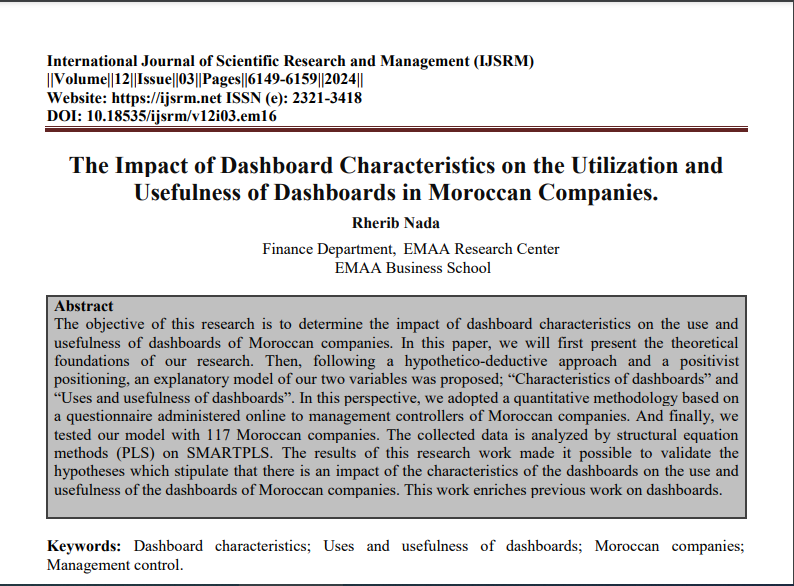The Impact of Dashboard Characteristics on the Utilization and Usefulness of Dashboards in Moroccan Companies

Submission to VIJ 2024-03-18
Keywords
- Dashboard characteristics; Uses and usefulness of dashboards; Moroccan companies; Management control.
Copyright (c) 2024 Nada RHERIB

This work is licensed under a Creative Commons Attribution 4.0 International License.
Abstract
The objective of this research is to determine the impact of dashboard characteristics on the use and usefulness of dashboards of Moroccan companies. In this paper, we will first present the theoretical foundations of our research. Then, following a hypothetico-deductive approach and a positivist positioning, an explanatory model of our two variables was proposed; “Characteristics of dashboards” and “Uses and usefulness of dashboards”. In this perspective, we adopted a quantitative methodology based on a questionnaire administered online to management controllers of Moroccan companies. And finally, we tested our model with 117 Moroccan companies. The collected data is analyzed by structural equation methods (PLS) on SMARTPLS. The results of this research work made it possible to validate the hypotheses which stipulate that there is an impact of the characteristics of the dashboards on the use and usefulness of the dashboards of Moroccan companies. This work enriches previous work on dashboards
References
- Bouquin H. (1994), The foundations of management control, PUF, Que sais-je collection
- ?, 128 p.
- Chiapello E. and Delmond MH (1994), “Management dashboards, tools for introducing change”, Revue Française de Gestion, January-February, pp. 49-58.
- Chin WW (1998), The partial least squares approach to structural equation modeling, in
- GA Marcoulides (Ed.), Modern Methods for Business Research, 295–358, Mahwah, NJ: Lawrence Erlbaum Associates.
- Chong VK and Chong KM (1997), "Strategic Choices, Environmental Uncertainty and SBU Performance: A Note on the Intervening Role of Management Accounting Systems", Accounting and Business Research, 27(4), pp. 268–276.
- Germain C. (2003), “The “ UnBalanced Scorecard “or the analysis of the differentiation of performance measurement systems”, Proceedings of the congress of the French-speaking Accounting Association, Louvain.
- Govindarajan V. (1988), "A Contingency Approach to Strategy Implementation at the Business-Unit Level: Integrating Administrative Mechanisms with Strategy", Academy of Management Journal, Vol. 31, No. 4, pp. 828-853.
- Ittner CD and Larcker DF (1998), “Innovation in Performance Measurmement : Trends and Research Implications”, Journal of Management Accounting Research, Vol. 10, pp. 205-238.
- Kaplan RS and Norton DP (1996), “Linking the Balanced Scorecard to Strategy”, California management Review, Vol. 39, No. 1, pp. 53-79.
- Kaplan RS and Norton DP (1996), “The Balanced Scorecard: Translating Strategy into Action”, Harvard Business School Press, Boston, Massachusetts, USA.
- Kaplan RS and Norton DP (1992), “The Balanced Scorecard – Measure that drive performance”, Harvard Business Review, February, pp. 71-79.
- Kaplan RS and Norton DP (2003), The balanced dashboard, Éditions d'Organization, Paris. The Harmattan , p. 43.
- Lebas M. (1995), “Yes, we must define performance”, Revue Française de Comptabilité, July August, pp. 66-71
- Marcoulides , G.A., & Saunders, C. (2006). Editor's comments: PLS: a silver bullet?. MIS quarterly, iii-ix.
- Marmuse C. (1997), Performance, Economica,P. 2194-2208
- Morin EM, Savoie A. and Beaudin G. (1994), The effectiveness of the organization - Theories, Representations and Measurements, Gaëtan Morin editor
- RHERIB.N & al. (2021) “Uses of management dashboards: Descriptive analysis”, Revue Internationale des Sciences de Gestion, Volume 4: Number 2 pp: 433-445.
- RHERIB.N et al. (2021) “Impact of dashboard characteristics on the organizational performance of Moroccan companies: Exploratory factor analysis”, Revue Internationale des Sciences de Gestion, Volume 4: Number 4” pp: 506 -5288
- Tennenhaus M. (1998): PLS regression, theory and practice – Paris Technip
- ZIAN H. (2013), "Contribution to the study of dashboards in decision support for SMEs in search of performance" Publicly supported on January 28, 2013